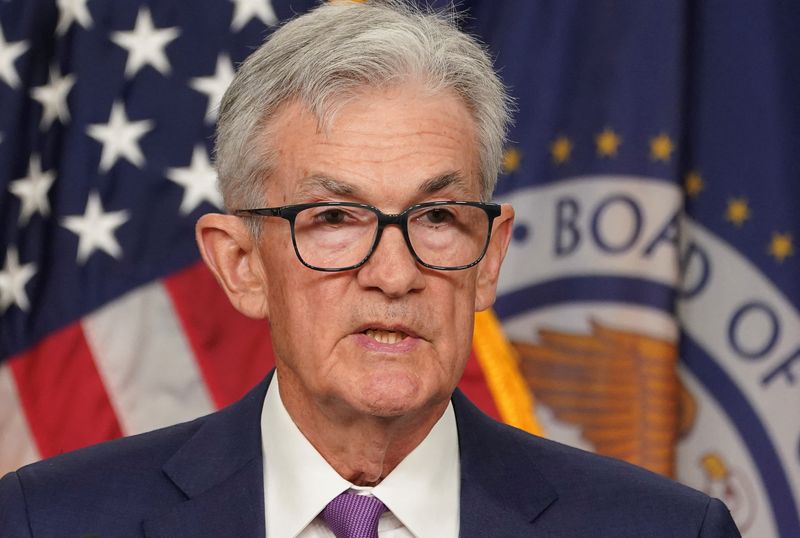By David Randall and Davide Barbuscia
NEW YORK (Reuters) - Federal Reserve Chairman Jerome Powell's reassuring message following the central bank’s monetary policy meeting may not calm frazzled U.S. stock and bond investors, as uncertainty over the path of inflation intensifies the focus on upcoming data.
Though Powell on Wednesday acknowledged a lack of recent progress in the Fed’s battle against rising consumer prices, he reiterated the view that interest rates are likely headed lower this year.
That was a relief for those worried the Fed could be eyeing more rate increases after three straight months of stronger-than-expected inflation.
Still, some investors believe the market will be less likely to take Powell at his word this time around after a much-heralded dovish pivot in December was followed by several months of upside surprises on inflation and employment. Another string of robust economic data could revive rate hike fears and fuel further turbulence in stocks and bonds, they said.
Market swings on Wednesday reflected investors’ nervousness: the S&P 500 closed down 0.3% following a rally that saw it gain more than 1% during Powell’s press conference. Yields on the benchmark 10-year Treasury, which move inversely to prices, dropped nearly 10 basis points.
“If the Fed is going to be as data-dependent as they claim to be, every data point will be scrutinized by the market to see whether it means higher for longer or the possibility that rate hikes are back on the table,” said Steve Hooker, a portfolio manager at Newfleet Asset Management.
The first key data point comes on Friday, with the closely watched U.S. employment report. More evidence of a stronger-than-expected labor market could continue to erode forecasts for how deeply the Fed will cut rates this year. Investors are now pricing some 35 basis points of cuts in 2024, compared with more than 150 basis points priced in January.
Data on everything from inflation to retail sales follow later in the month.
Though stocks are not far from record highs hit earlier this year, their rally has wobbled as rate cut expectations have been whittled away in recent weeks, leading the S&P 500 to notch its worst performance since September last month.
Bond investors have been struggling for months, with the 10-year Treasury yield up 70 basis points year-to-date.
“Market expectations have swung from one extreme to another,” said Paul Mielczarski, head of global macro strategy at Brandywine Global. He is overweight five and seven-year Treasuries relative to his firm’s benchmark in anticipation that the Fed will eventually cut rates more than the market expects.
“Naturally the market is a little bit cautious ... and is waiting for the data to confirm the Fed’s underlying view that inflation can come down to 2 percent without needing a recession,” he said.
Some investors fear the clock may be running out for the Fed to cut rates, though it's relatively early in the year. Blerina Uruci, chief US economist at T Rowe Price, believes the Fed will need to have at least three months of weaker-than-expected data to be confident enough to cut rates.
“If we don’t see the weakness in rental prices in the private sector translate into the (consumer prices) data, how much more faith should we have that the deflationary impulse will continue to happen?” said Uruci. “I don’t think this reversal in the inflation trend will happen quickly enough,” Uruci said.
Others worry that elevated rates will soon start pressuring some U.S. companies. Jonathan Duensing, head of US fixed income at Amundi US, favors investment grade corporate debt partially because he believes a prolonged period of high interest rates could create some stress in lower-rated companies.
He was also bullish on Treasuries that would likely benefit from a flight-to-quality bid in case “of a stumble in the economy down the road,” he said.
That’s not to say that investors have completely given up hope on rate cuts. Tony Welch, chief investment officer at SignatureFD, believes that much of the pickup in inflation earlier this year came due to commodity prices, which soared in part due to worries over a widening conflict in the Middle East.
Oil prices fell to a seven-week low on Wednesday on a surprise build in U.S. crude stocks and the prospect of an Israel-Gaza truce.

Welch is optimistic on small cap stocks, which he believes will benefit from an easing interest rate environment, as long as the economic outlook remains benign.
“I’m pretty confident that (the Fed is) right and they’re reading the inflation tea leaves correctly,” he said.